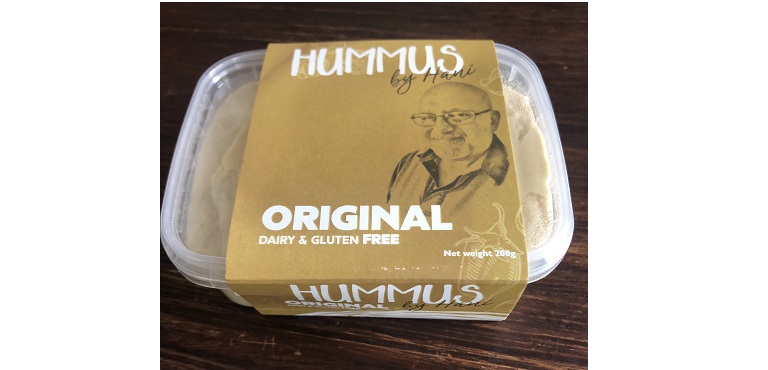
Baladi Foods sees fast growth in hummus during lockdown
Baladi Foods, the Northern Ireland producer of traditional Palestinian hummus, has seen sales double during the current Covid-19 lockdown primarily from a decision to introduce a doorstep delivery service.
Based at Carrickfergus in county Antrim, the company is owned and managed by Hani Muhtadi who hand crafts Hummus by Hani branded original and roasted red pepper.
Mr Muhtadi puts the sharp growth in sales, especially of his handmade original hummus, over the past two months down to the launch of the contact-less delivery service, support loyal customers and the growth in home meal preparation in which “people are increasingly seeking different tastes’. He says.
“It’s been hectic for us over the lockdown,” says Mr Muhtadi. “I’ve been delivering to existing and new customers in very many parts of Northern Ireland. As a result of the growth in business, I’ve brought forward plans to expand production and I am currently exploring a move to new premises which will give me more room for faster growth,” he adds.
“I’ve been covering a lot of ground to generate cash and also to increase awareness in the market of the health benefits of hummus. I’ve been thoroughly impressed by the feedback and repeat orders especially from new customers. The lockdown has also given me time to finalise exciting new products,” he says.
Originally from Jerusalem, Mr Muhtadi is an experienced sales professional who has been based in Northern Ireland since 1998 and has been on the management teams of leading manufacturing businesses throughout the UK and Middle East.
He founded Baladi Foods in 2018 and launched the hummus products because he spotted a gap in the market from the growing interest in healthy plant-based and vegan free foods.
He decided to make his own hummus because he couldn’t find a product here with the same quality, texture and especially the rich taste he enjoyed at home in Palestine. “Natural hummus is always on the table in Palestine and other parts of the Middle East,” he says. “It has a wide variety of uses especially as an appetizer and as a dip with flatbreads of pitta bread.
“Hummus, in addition, is a very tasty accompaniment for grilled chicken and fish and an essential element in a delicious and healthy Mediterranean mezze platter of vegetables and cheese. Chicken and fish have grown in popularity for family meals during the lockdown. More people than ever are concerned about healthy eating,” he adds.
He continues: “Hummus, a vegan product, is essentially a creamy but non-dairy spread made from ground chickpeas, sesame seeds, tahini paste with lemon, olive oil and garlic. In Palestine hummus is usually garnished with olive oil, mint leaves, paprika, and parsley.
“Not widely used or appreciated in the UK and Ireland, chickpeas, for example, are popular in the Middle East and India particularly in salads, soups, stews and curries. They are said to be nutrient dense, rich in protein, dietary fibre, folate and minerals especially iron, phosphorous, thiamine, vitamin B, magnesium and zinc. Hummus is sometimes served with tortilla chips or crackers outside the Middle East,” he adds.
His hummus is based on an old family recipe from Palestine. Hani continues, “I used to watch my mother making it while I was growing up in Jerusalem and I’ve continued to make it the same way in Carrickfergus.”